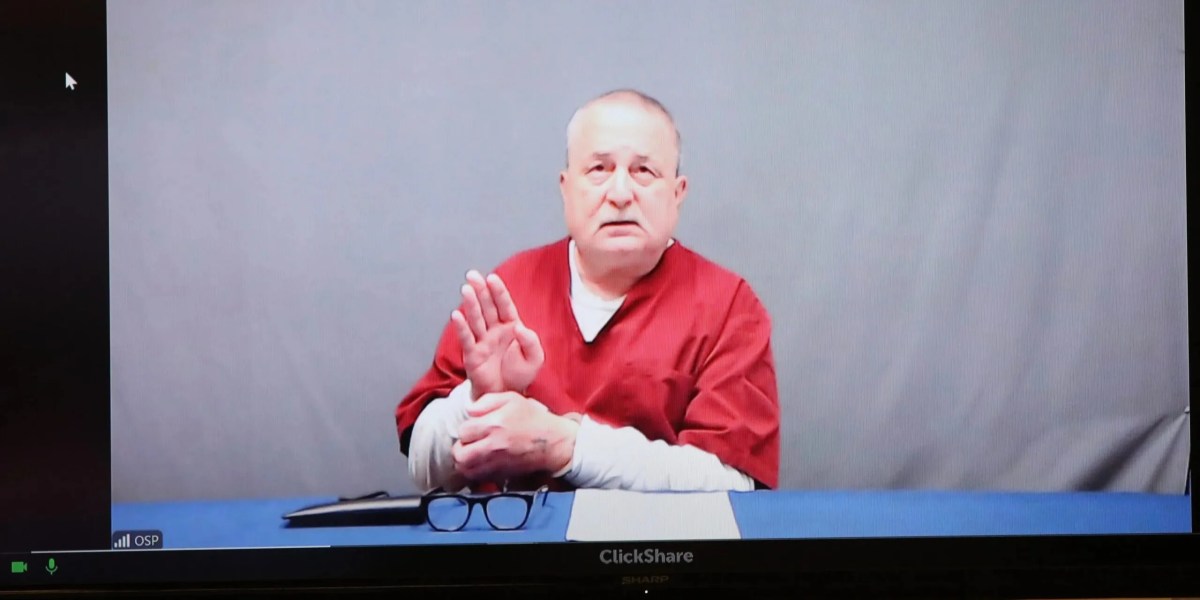RICHARD ROJEM JR. had 20 minutes to address the Oklahoma Pardon and Parole Board. Wearing a maroon prison uniform, he raised his cuffed right hand and swore to tell the truth, then gave his pitch for why his life should be spared. It would take less than 90 seconds.
“This hearing didn’t have to take place,” he began. Prosecutors had offered a plea deal right up until the day of his 1985 trial; if he’d admitted to abducting, raping, and murdering his young stepdaughter, Layla Cummings, Rojem could have avoided a death sentence. But he refused: “An innocent man doesn’t ever plead guilty to a crime he hasn’t committed.”
Rojem spoke via video link from the Oklahoma State Penitentiary in McAlester. It was June 17, and his execution was 10 days away. At 66, he’d been on death row for virtually his whole adult life. He’d survived for so long in part because appellate courts had deemed his original trial to be unfair, upholding his conviction but twice overturning his death sentence. Meanwhile, fingernail scrapings taken from Cummings revealed an unknown male DNA profile and nothing from Rojem. This was potentially powerful exculpatory evidence. But a third jury, unaware of the DNA testing, resentenced him to die.



One of many reasons I oppose the death penalty for almost all crimes.
The only purpose executions serve is revenge, and the state should not be in the revenge business.
The death penalty is an important bargaining tool with the spies of other countries in regards to serious cases of espionage.
It may be necessary to apply the death penalty in the case of a state in dire circumstances in which the release or escape of a prisoner may be regarded as deadly to the commonwealth - such as a dictator with large minority support or support amongst the elite still remaining being prosecuted for their crimes.
As deterrent in extreme matters of desertion, war crimes, or crimes against peace.
Fucking wild that a place where the sentiment of ‘eat the rich’ is commonly passed around recoils at the idea of executing a dictator after a trial if his crimes warrant it and there’s a reasonable threat that he could be sprung and returned to power by the elite or a radical minority.
Like, really?
Death sentence does not, and has never, worked as a deterrent.
It’s also super fucked to say “sometimes you gotta kill a guy cause too many people agree with him.”
The death penalty doesn’t work on irrational actors - ie the desperate and the mentally unwell. Those who commit most crimes. The death penalty as a deterrent to rational actors (such as opportunistic politicians) is very much part of the mental calculus that goes into decision-making.
No, that’s actually pretty normal. People agreeing with genocidal dictators is a bad thing, and taking out the dictator is greatly preferable to taking out all the people who agree.
Rarely is it a rational gov’t/populace that takes out its own dictator tho. Usually it’s a military coup, so just substituting one dictator for another.
Uh, I don’t exactly know how you square that with the large number of countries which successfully overthrew their own dictators in the past century.
Those are all arguably fair - but they seem to apply to national military judicial systems as opposed to civilian criminal courts.
Edit: And when it comes to the United States, those offenses would be federal ones, found in the Federal Death Penalty Act of 1994 - an Act which I still think goes too far. Above, I used the word “state” in its general sense. US States have no purpose applying capital punishment beyond revenge.
Espionage outside of wartime is still done through the civilian courts, and treason trials (such as for an ousted genocidal dictator) would likely be done through civilian courts as well.
But yes, they’re generally more military/extreme edge cases that I feel the death penalty is warranted in. Murder? Theft? Taking up two parking spaces? Prison is good enough.
That I agree with.
Life without parole.
It makes zero sense: they say they don’t trust the government for the simplest things but suddenly they cool with it making life/death decisions often informed by legit incompetence/malevolence.
They are not serious, good-faith people who should have any influence or agency